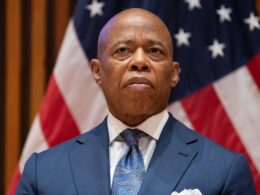When I look back on the aftermath of the George Floyd murder five years ago, I recall the weeks after the 9/11 attacks and how New Yorkers responded.
Gone was the discord and rudeness that is often synonymous with the Big Apple. In its place was a spirit of unity and kindness, a solidarity born out of unspeakable tragedy.
That didn’t last long. Before you could say Freedom Tower or Homeland Security, New Yorkers were back to minding their own business and fighting each other over parking spaces.
So, too, it is with George Floyd. We were promised a reckoning. What we got was a rewind.
“George Floyd’s murder shook the world — but shaking the world is not enough,” Marc Morial, president and CEO of the National Urban League, said in a statement. “Did we seize the moment to build a lasting movement, or did we squander the chance for transformative change?”
George Lloyd
Morial’s venerable organization, as old and important as any civil rights organization, is behind a new report that examines the years since Floyd’s murder, a study that asks the haunting question: “Was it a movement or a moment?”
It certainly started off as a movement.
Floyd, an unarmed Black man, died May 25, 2020 on Memorial Day, when cops in Minneapolis were arresting him for allegedly passing a counterfeit bill at a grocery store.
Cellphone video showed one of the white cops, Derek Chauvin, pressing his knee into Floyd’s neck for more than nine minutes while the other officers looked on.

Floyd suffocated after telling his tormentors he could not breathe. Yet it took four days before Chauvin was finally arrested. He was later convicted of murder.
In the weeks and months after the murder, there were protests across the country, and promises of police reform. But instead of real change, we settled for superficial handouts.
We got statues of Confederate generals removed.
We got Netflix to show more Black movies.
We got Amazon to sell more books about the African American experience.
We got Aunt Jemima’s portrait off the pancake box.
We got Uncle Ben’s picture off the boxes of rice.
We got “Gone With the Wind” off HBO.
We got newspapers to capitalize the B in Black.
What we didn’t get was the cops in Memphis convicted for beating Tyre Nichols to death.
Among the highlights of the Urban League report is how how initial outrage over Floyd’s death sparked corporate pledges of more than $66 billion for racial justice programs.
Corporations, higher education institutions and non-profits all chipped in to fund the fight against systemic racism.

But those same programs, especially in the months since President Trump returned to the White House, have faced increasing backlash, underlined by recent executive orders eliminating federal diversity programs.
According to the National Urban League, DEI job postings declined 44% from 2022 to 2023, and major companies like Google and Meta scaled back programs supporting Black talent.
Morial, a former mayor of New Orleans, said the report is a “sobering reflection on America’s racial justice journey.”
“Five steps forward, three steps back,” Morial told NBC News after his organization’s report came out. “I’m disappointed, and somewhat shaken by the idea that commitments so significant and so powerful were made and now, too many are backing off.”

And the change from reckoning to rewind seems to have happened overnight. One day we’re saying that Black Lives Matter, and the next day we’re fighting for diversity, equity and inclusion.
Translation: It might get worse before it gets better.
”That is the risk,” Morial said, “that it’s five steps forward and eight, nine, 10 steps back.”








